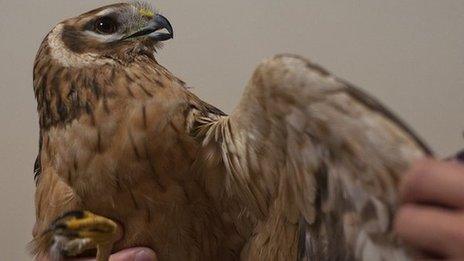Malta bird hunting vote: Tradition and conservation clash
- Published
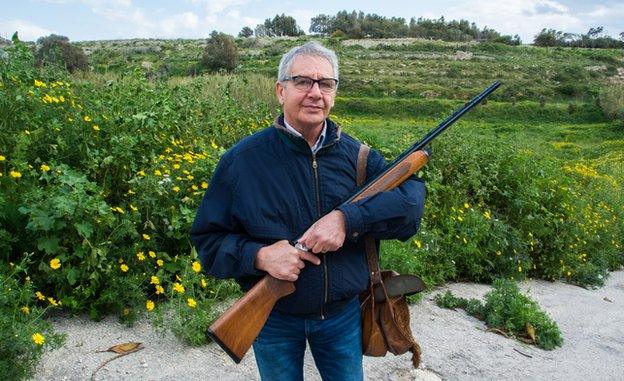
Reggie Calleja says spring hunting is a traditional way of living
Malta has seen its fair share of battles over the centuries, most famously in the ferocious fighting against the Nazis during World War Two.
Now its skies are a battleground once more - but this time between conservationists and hunters, over whether wild birds should be shot in spring.
"My shotgun is part of my life."
Reggie Calleja has been hunting birds in Malta for 58 years. For the last 43 of them, he has owned the same shotgun.
"I keep it in showroom condition," he says, cradling the gleaming wood and metal.
But the 65-year-old retiree may soon have to pack his beloved gun away more often, if Malta's referendum on Saturday bans the hunting of birds in the spring.
Some 45,000 Maltese signed a petition last year, triggering a vote on whether to close the spring hunting season, which runs from the middle to the end of April.
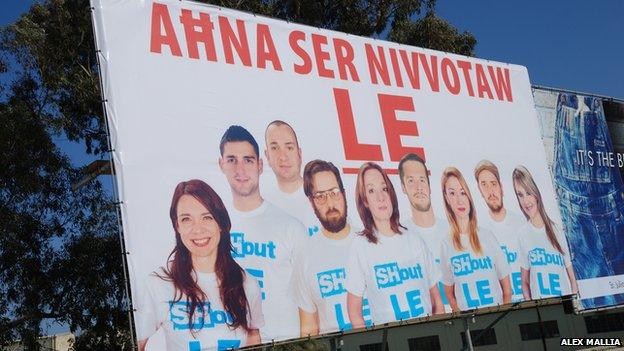
A second season in autumn is not included in the referendum.
Crucial migration
Malta is the only EU country that allows recreational spring hunting.
The European Union's Birds Directive, external, which regulates the hunting of birds across the EU, makes two exceptions for Malta, allowing people to hunt turtle doves and quail in the spring, under strict regulations.
But conservationists say the hunting season is abused by some hunters through the illegal shooting of other, protected species.
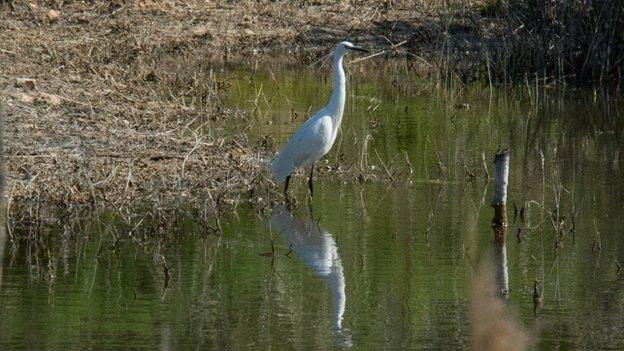
There have been cases of little egrets being shot illegally
They also want the season permanently banned because it takes place during a crucial migration period for both species of hunted birds, as they pass over Malta into Europe.
Birdlife Malta conservation group says turtle dove numbers have declined 77% since 1980.
So this is a tense issue on the island, an uncomfortable clash between conservationists and those who say a Maltese tradition is at stake.
'Way of living'
"This is something that really gets me in my heart, because for me I'm losing... what my father taught me about hunting," Reggie says.
"Spring hunting should be allowed in Malta because it's a traditional way of living."
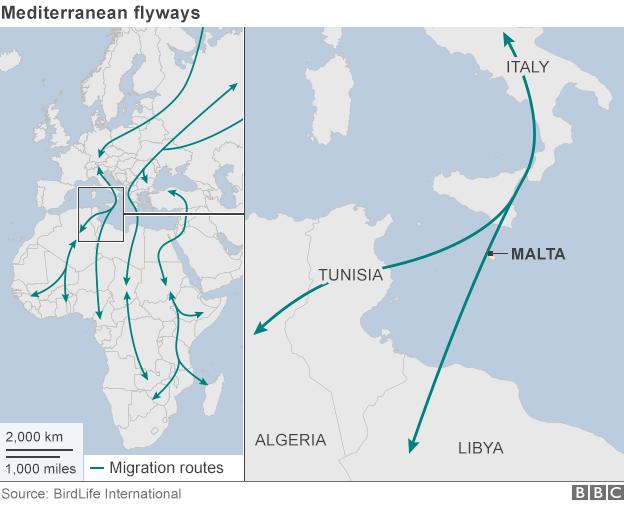
Reggie says that he has not shot any birds for two years, because the numbers of turtle doves in particular have severely dropped owing to a loss of habitat on the Libyan coast.
The birds are finding alternate routes into Europe, rarely crossing over Malta, he says.
Reggie has a straightforward message for those who think killing wild birds is cruel. "I'm sure they eat chicken, they eat rabbits.
"You have to kill to eat. What we hunt, we eat. We don't throw it away."
Taken up abroad
A ruling by the European Court of Justice in 2009, external found that Malta had been in breach of EU law by allowing spring hunting, external, because it had failed to fulfil its obligations under the Birds Directive.
But since then, successive Maltese governments have developed legislation to make sure it can continue.
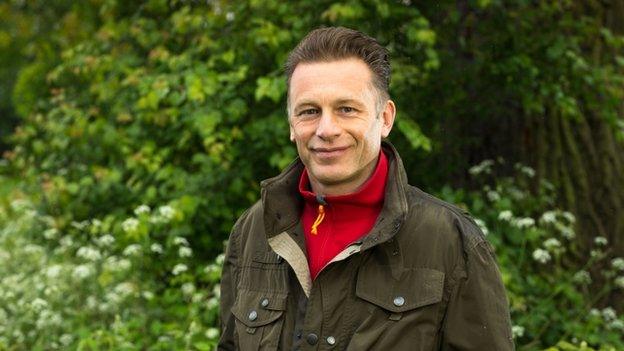
Leading British naturalist Chris Packham said rare species were being targeted in Malta
This matter has been taken up abroad, with Britons such as conservationists Chris Packham, Bill Oddie and even Queen guitarist Brian May calling for this hunting season to be stopped.
Conservationists from Germany have also visited Malta to protest against it., external

Maltese spring hunting
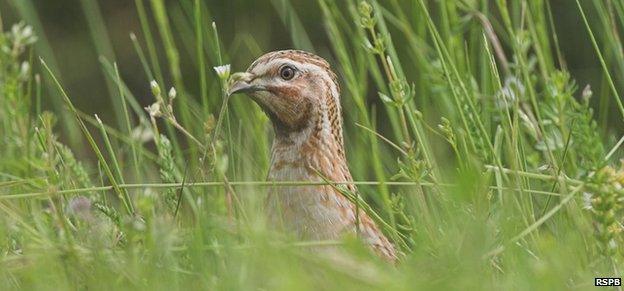
Hunters in Malta are allowed to shoot quail in the spring season
Limit set at 11,000 turtle doves and 5,000 quail
Spring quota is worked out based on number of hunting kills made in the autumn season
Spring hunters are not allowed to kill more than two birds a day - turtle dove and quail - and are limited to four birds per hunter in the whole season
Licensed hunters must apply for a special spring hunting licence
Hunters are legally required to declare every time they go hunting or when they make a kill, before leaving the hunting area
Hunting fines are €5,000 for first offence, a year in prison and licence revoked. Secondary offences are €10,000 and two years in jail

The Maltese campaign against this hunting season is called Spring Hunting Out (SHout).
Spokeswoman Moira Delia, a TV presenter, says Malta is the first island that birds cross when travelling from Africa to northern parts of Europe, before they continue their journey to breed.
"We are saying no to the killing of breeding birds, which is common sense, really."
She raises a common argument against the hunters - that they dominate the restricted amount of open space on the island.
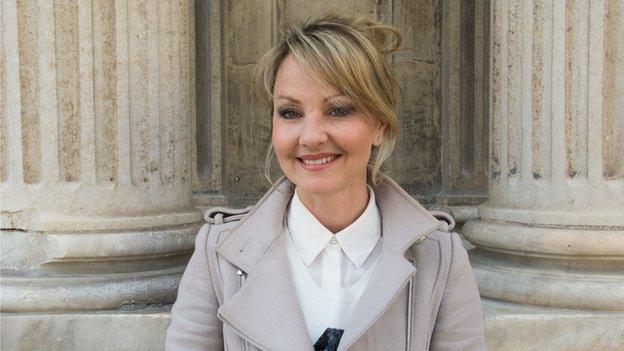
Moira Delia is a spokeswoman for the Spring Hunting Out campaign (SHout)
"We never manage to walk freely and use what's left of our countryside. We come across these vulgar and very intimidating men, armed, who shout at us and send us home.
"The hunters have taken over."
Bad publicity
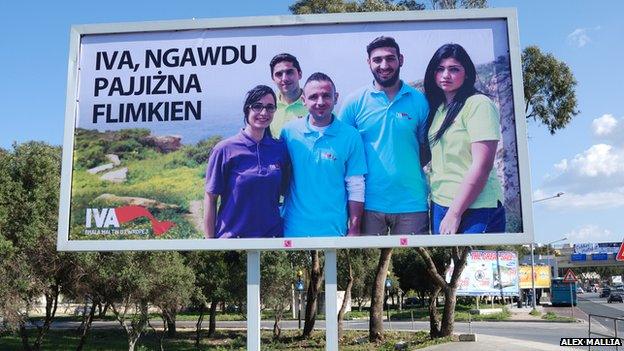
People who support the hunting season often say it is a way of life
Mark Mifsud Bonnici is president of St Hubert Hunters, a union with 1,000 members.
He says hunters take out their guns for about 19 half-days in spring because while there are 32 species which can be hunted in autumn, turtle doves and quail are only seen in spring, during their migration pattern.
"The bad publicity we get is definitely not related to reality. If there's 10,000 people shooting here and they're all doing illegal things, we wouldn't see one bird flying over Malta."
He says illegal hunters should not be allowed a licence, but that incidents of protected birds being shot are now "practically nothing".
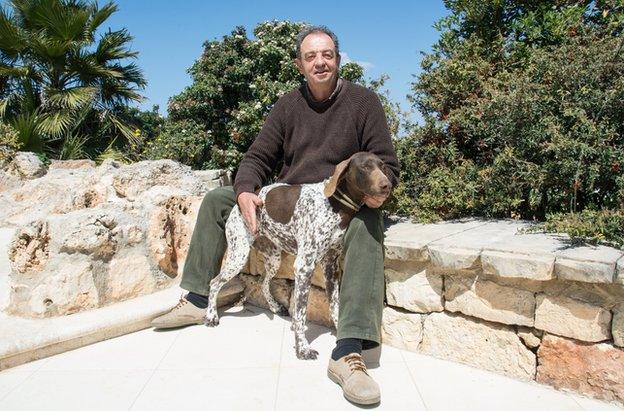
Mark Mifsud Bonnic, a hunters' union president, says hunting birds is easier in Britain
He denies that hunters intimidate people in the countryside.
"We've been living in this country - which is practically the most overcrowded place on Earth - in peace and harmony for all these years.
"What's changed suddenly? Has something gone wrong where hunters are now the scourge of the Maltese population?"
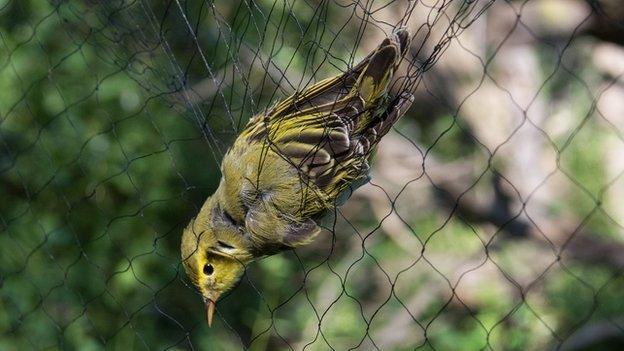
This bird was caught by Birdlife Malta so it can ringed and tracked
'Catastrophic injuries'
Wounded birds that are not collected by hunters often end up in the hands of Birdlife Malta.
Conservation manager Nik Barbara says the number of illegally-shot birds it deals with has "slightly improved" in recent years, but that the damage done is often catastrophic.
"A shotgun does quite a lot of damage, especially at close range - it practically blasts everything off.
"The most common injuries we get are to the wings. Unfortunately most of the cases end up having to be euthanised."
- Published22 April 2014
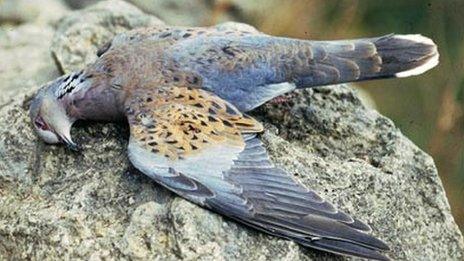
- Published29 September 2014
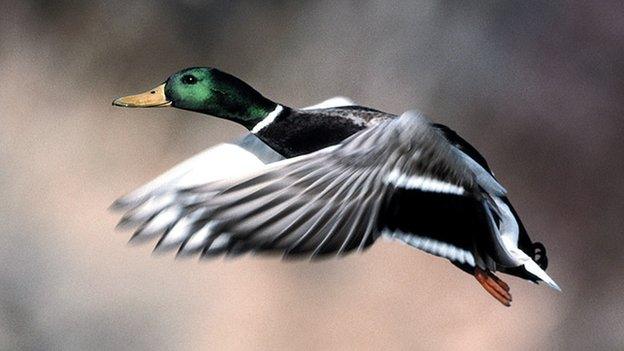
- Published22 April 2014
